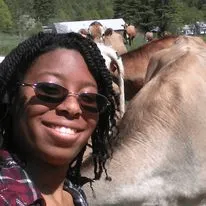In times of such challenge and change, it's possible to lose sight of the growth and thriving around us daily. But, truthfully, life mostly goes on - and that's maybe especially true on farms. Animals still need care, people still tend the earth, and in turn bring food and fiber and fuel to their customers and community.
One of the particularly bright spots in the Center's work supporting food and farming in these days is our continued participation in the national Dairy Grazing Apprenticeship program.
Dairy Grazing Apprenticeship is the only accredited apprenticeship for farming in the country. Its mission is to provide a guided pathway to independent farm ownership, to develop grazing careers, and to strengthen the economic and environmental well- being of rural communities and the dairy industry.
Why does this project matter to us, and especially right now? Because it lines right up with our vision of sustainable livestock farming that provides a good living for farmers, cares for the natural environment and is part of a just food system. Ensuring that new farmers are coming into their farming lives with the skills and knowledge they need to thrive is simply good planning for the future we want.
With all of this in mind, we caught up with current Vermont Dairy Grazing Apprentice Maia Nichi Springfield one recent afternoon to hear about her work at Cobb Hill Farm. Here's what she told us.
My favorite days are the ones where I'm doing cheese-making in the morning and milking in the afternoon. That's from 7 - 10 or 10:30, and then back to milking every afternoon except Wednesday. This morning started at 4 with a morning milking and most days start at 5.
I came to this because I was looking for an apprenticeship with both hands-on and book knowledge, and found the DGA website. I started reading about other people's stories. I was 16 or 17 then so I had to wait - but as soon as I turned 18, I applied. I heard from Kerry (farmer at Cobb Hill) in February, and also from someone else in Oregon - I was so excited!
I picked Vermont, and my mom and sister came to bring me here in March. (Education Coordinator Mary Ellen Franklin points out amazedly, "She arrived just at the start of the Covid-19 pandemic!") It was a bit rough in the beginning, with a new environment and a kind of work that I wasn't used to. But I'm used to it now!
The first day, Kerry had me clean out a calf pen, because there just was nothing else for me to do. It was a big job, and not like anything I had ever done. I wondered "What have I got myself into?" But I get it - they throw you in to something like that, and then nothing else seems so bad.
I don't make the cheese but do work with it after it's made. I trim it, weigh it, bring it to the cave to put in a water-salt solutions, then put them on the racks. We make a few kinds and my favorite one is the Gouda.
As far as the program itself, I usually tell people it's balanced - you've got both sides with the book-work and the hands-on. It's not too much or too little - it's balanced. The DGA people don't give you too much so you can handle it. I love that it's two years so you get a good foundation - not just one season.
The classes are all online. Some of the assignments are based on the farm - things we have to do about different goals. This week I'm helping with soil testing. What I need to learn and what we do on the farm can overlap like that.
Some of what happens is just funny. There have been a few times when cows escape. A calf named Wonder, who we just sold - I was cleaning out her pen, I went to close the door and she just bolted. I was chasing her all over the farm, and I ran into Steven, and he went and got a halter. She was so fast - it was exciting. She had a lot of spirit and I was actually sad to see her go.
Now I'm thinking I might complete this and then see if I might stay a third year, and then I want to start my own farm. Raising animals and growing crops for people who need it. I know I have to start small and build up and see how it all goes. I know managing a farm is going to be different - it's all on you and you have to go through the trial and error of that. But I can start with the things that I know - cows since that's what I'll have a foundation in. And definitely staying in touch with Kerry and Steven for advice!
If you are an experienced grazier and dairy farmer interested in bringing an apprentice into your operation - or if you know a young person looking to build their skills and knowledge - let us know. These connections are the heart of the future of a thriving farm system and vibrant working landscape for all of us.
